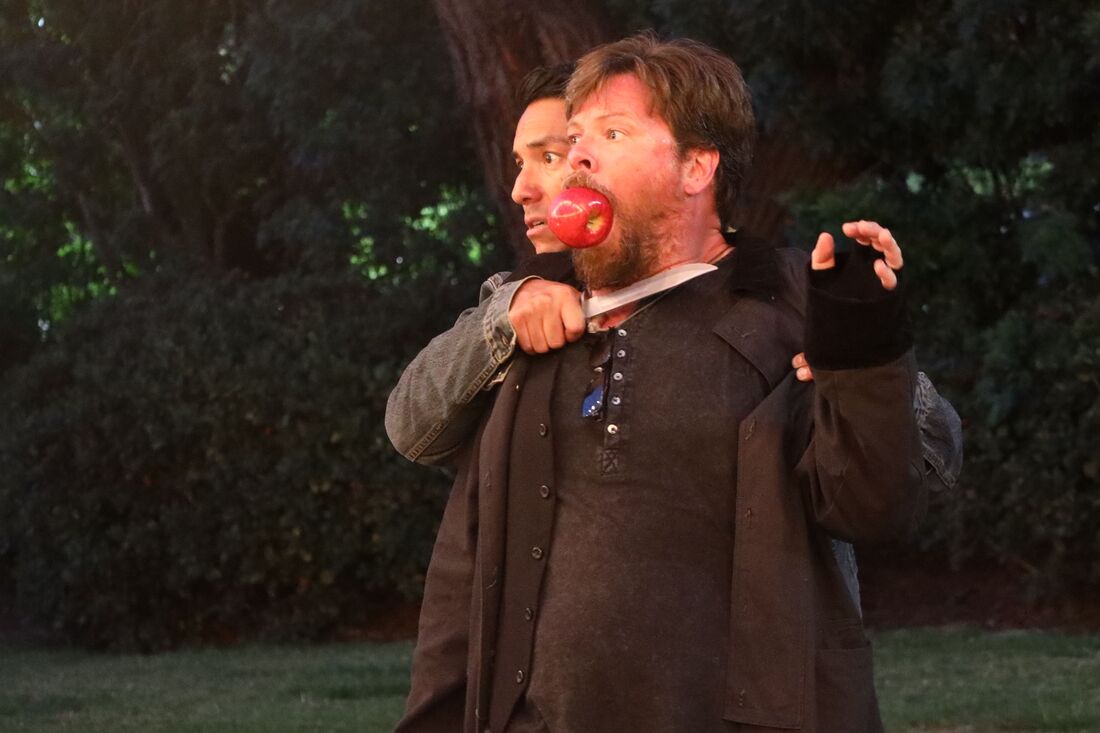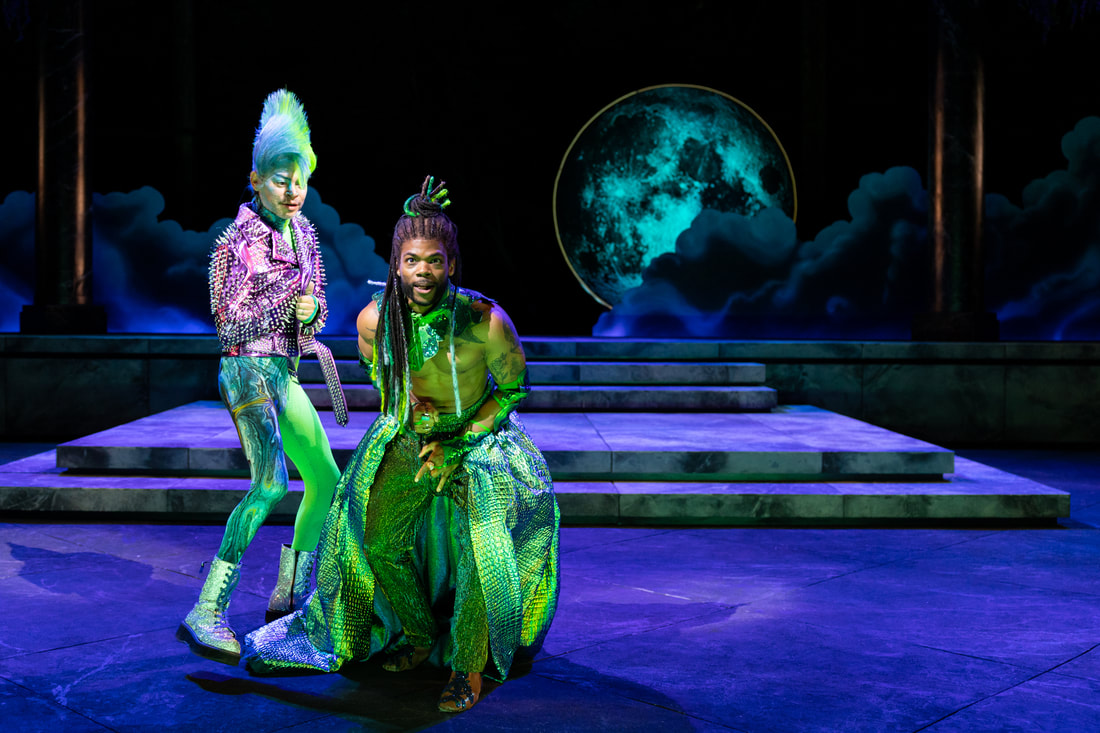|
Sutheshna "Suthe" Mani (left) and Sarah Alida LeClair in "The Pleasure Trials." Photo by Daren Scott What if there was a pill a woman could take that would boost her sexual desire and ramp up her libido?
There is such a pill in playwright Sarah Saltwick’s “The Pleasure Trials,” now onstage at Moxie Theatre. Dr. Rachel Milan (Sarah Alida LeClair) is a dead-serious researcher who believes she has developed a medicinal antidote to Female Desire Deficit Disorder, a syndrome that was identified and defined in a thesis by aspiring doctor Callie Young (Suthe Mani), who is now her assistant. Together they are conducting a trial study to determine the efficacy of the unnamed drug, each hoping it will ultimately earn FDA approval. The younger, more excitable Callie wants to be rich and famous; the grimly determined Dr. Milan wants to be the creator of a “miracle” pill. Much of the first act of “The Pleasure Trials” is comprised of various study volunteers (all played by Andrea Agosto) being interviewed then returning regularly to report on their reactions or side effects (or lack thereof). Dr. Milan and Callie, meanwhile, interpret numbers and readouts and speak in deadening research jargon. The proceedings slog forward in spite of the personality Agosto instills in her multiple characterizations and the presence onstage of cellist Sharon Taylor, who adds grace notes or sound effects when needed. It’s not until the far more engaging second act of “The Pleasure Trials” that the production directed by Marti Gobel sparks: Callie, after a breakup with her boyfriend, gobbles down a fistful of anti-FDDD pills, while through an attraction to one of the study volunteers Dr. Milan reveals why she is the way she is. If “The Pleasure Trials” was intended to be a comedy, you wouldn’t know it until Act Two. If “The Pleasure Trials” possesses tangible conflict, you wouldn’t know that until Act Two either. The polar opposites that are Rachel Milan and Callie Young are so mismatched as collaborators that one wonders how they ever got this far in an actual research study. As the uptight doctor, LeClair is hamstrung by her character’s almost complete interiority. At least Mani gets to bust loose in the second act, though after popping way too many libido pills she comes off as high on Maui Wowie more than on sheer lust. Versatile as Agosto is in her many turns as study volunteers, the play would be more interesting, especially in Act One, if a series of different actors played these roles. It’s not easy to suspend disbelief. There’s no disputing that Saltwick’s play addresses important questions about female sexual desire and a woman’s right to not only happiness but pleasure. If only it did so with more vibrancy, more humor and less research-speak. “The Pleasure Trials” runs through Sept. 11 at Moxie Theatre in Rolando.
0 Comments
Gerald Ramsey as Mufasa in "The Lion King." Photo by Michael Murphy You never forget your first time.
Seeing “The Lion King.” For me it was in Hollywood at the Pantages Theatre back in the late ‘90s or early aughts … I’m not certain. But many years afterward, I remember vividly the thrill of the musical’s first 10 minutes, the “Circle of Life”/”Nants Ingonyama” entrance of the African animals into the theater – a stately parade down the aisles toward the stage. So it was again last night at the Civic Theatre downtown in Broadway San Diego’s presentation of the nationally touring “The Lion King.” This year marks 25 since the Disney production based on the 1994 animated film, with music and lyrics by Elton John and Tim Rice, debuted on Broadway. Today “The Lion King” is the third-longest running musical on the Great White Way, and there’s no reason to believe it will be gone anytime soon. The peerless Julie Taymor first directed “The Lion King” and created the costumes and mask and puppet design (with Michael Curry) for what is as dazzling to the eye as a theatrical production can be. There’s so much to take in and experience throughout the show one hardly knows where to focus. If it sounds like I’m gushing, maybe that’s the sentimental attachment this big kid has for “The Lion King” and its coming-of-age story of life’s renewal and respect for all living things. Or maybe it’s just that all these years later it remains a damned entertaining spectacle. The magic and precision of Taymor and Curry’s puppetry may exceed the book by Roger Allers and Irene Mecchi and even Sir Elton’s and Sir Tim’s score, but ultimately all components of “The Lion King” succeed harmoniously as they have from the beginning. This touring ensemble is anchored by the ebullient Gugwana Diamini as the narrator Rafiki. In the musical’s three major comedic parts – that of Zazu, King Mufasa’s major domo, and young Simba’s friends Timon the meerkat and Pumbaa the flatulent warthog – Jurgen Hooper, Tony Freeman and John E. Brady respectively are clear favorites with the audience, one populated heavily by parents with children. Gerald Ramsey projects the due integrity and gravity of Mufasa, though Spencer Plachy never seems as evil as he should be as the mad king Scar. Could be that his surrounding brigade of hilarious hyenas minimizes his menace. Slightly overshadowed by all the larger-than-life supporting characters are Darian Sanders as the grown Simba and Kayla Cyphers portraying the lioness Nala who will become his queen. That’s no knock on their performances, which include some beautifully staged sequences: Nala’s flight from the Pride Rock corrupted by Scar in “Shadowlands”; Simba’s reckoning with his legacy and his duty in “He Lives in You”; and the balletic “Can You Feel the Love Tonight,” which is “The Lion King’s” ballad partner to its carefree frolic “Hakuna Matata.” You’ve read this far and not a word about the plot of “The Lion King,” right? As if you didn’t know it by now. Suffice it to say that the Circle of Life is destined to prevail and that all living creatures of the African savanna get their moments in the footlights. Oh, and Simba learns that growing up comes with sometimes painful lessons – all of them worthwhile. “The Lion King” runs through Sept. 11 at the Civic Theatre, downtown. Steven Lone and Richard Baird (with apple) in "As You Like It." Photo courtesy of New Fortune Theatre Company Sitting outside in a quaint amphitheater in the round with a hazy moon overhead and the faint sounds of crickets chirping in the air, I breathed in an unfettered and unadorned production of “As You Like It” and wondered if this was how Shakespeare meant it to be.
After a five-year hiatus, the New Fortune Theater Company founded by Richard Baird and Amanda Schaar has returned to live productions with a staging of The Bard’s much-loved pastoral comedy under the stars behind Westminster Presbyterian Church in Point Loma. It’s not a permanent venue for the company, but for the purposes of this particular play and a celebration of New Fortune’s return, it’s ideal. Actors perform under strings of lights sans set or amplification, coming and going from wings that are a church parking lot or the gateway to adjoining Westminster Park. The play’s six songs, such as “Under the Greenwood Tree,” are performed live – just singer/actor (Jaden Guerrero) and stringed instrument. There are no bells and whistles in this Forest of Arden. Dan Hodge directs this production of “As You Like It,” with Schaar starring as the heroine, Rosalind, and Baird in the role of the melancholy Jaques. The cast includes Steven Lone as Rosalind’s stalwart suitor Orlando, Brian McCann as Touchstone the fool, Rachel VanWormer as Rosalind’s exasperated cousin Celia, and Neil McDonald as both Duke Senior and Duke Frederick. All are in peak form. So regularly is “As You Like It” produced – the Old Globe Theatre launched its Summer Shakespeare Festival with it in 2019 – that its story is as familiar as any of the Shakespearean comedies: Rosalind flees her tyrannical uncle, in the company of Celia, and finds herself and the man with whom she’s fallen in love, Orlando, there as well. A game of disguise and flirtation ensues. Love at first sight is de rigeur in the forest, where shepherd Silvius (Geoffrey Ulysses Geissinger) pangs after shepherdess Phoebe (Taylor Henderson), Celia flips for Orlando’s older brother Oliver (Michael Rodriguez) and even Touchstone finds his true love, the goatherd Audrey (Leigh Akin). The exception to all this toujours l’amour is the brooding Jaques, he who affirms with dismissal that “All the world’s a stage and all the men and women merely players.” Clad fully in black and at times in shades, Baird conveys every bit of the character’s wryness and gloom. His moody observations are somehow more engrossing in the open air. Lone brings considerable physicality to Orlando, grappling early in the going with both his brother and the formidable wrestler Charles (Xander Brown). Schaar interprets Rosalind as playful but forthright. VanWormer and McCann are her delightful traveling companions. Danny Campbell, Durwood Murray and Walter Murray contribute much, too, to their supporting roles in what is a very strong cast. This is a lengthy show – about two and a half hours – and the amphitheater “seating” is in concrete bleachers, so lawn chairs are welcome (and will prove comfortable). The way the weather’s been lately, sweaters and blankets probably won’t be needed, but that’s up to you. “As You Like It” marks an inspired and diverting return for New Fortune Theater Company. See it some summer evening before it closes on Aug. 29. Christopher Michael Rivera (left) and Paul James in "A Midsummer Night's Dream." Photo courtesy of the Old Globe Theatre. What the Puck is going on here? Lysander, who was in love with Hermia, is now in love with Helena. Demetrius, who was also in love with Hermia, is now also in love with Helena? And Helena, who was in love with Demetrius, is now running for the hills. Hermia? Well, she’s still in love with Lysander, so now she thinks her BFF Helena is betraying her.
What fools these mortals be indeed. It’s not mere mercurial behavior. They’re under the influence of the magic of Robin Goodfellow, aka Puck, a sprite who’s doing the bidding of Oberon, king of the faeries. Only Oberon didn’t exactly decree the wild and crazy ramifications of Puck’s misguided spell. This is Act 3, Scene 2 of “A Midsummer Night’s Dream,” when all hysterical hell breaks loose. If you’re confused, you should be. That’s the charm of Shakespeare’s Athenian romp, dressed up for fantasy and populated by kings and queens, faeries, an eccentric acting troupe and those star-crossed lovers. The Old Globe Theatre’s new production of “Midsummer” is the beneficiary of inspired direction from Patricia McGregor, who emphasizes the play’s rampant passions and slapstick physical comedy. While being true to these integral components, she contemporizes the goings-on, as with original music by hip-hop artist Miki Vale (also presiding from above as DJ), without undermining the heart of the play. Even the inclusion of Journey’s insufferable “Don’t Stop Believin’” is brief, and it’s not too jarring when Quince from the acting troupe chides a male colleague for “mansplaining.” The DJ’s spoken preludes to scenes I could’ve lived without, but again, they’re quick and not intrusive. Like all good “Midsummers,” this one is spectacularly turned out – David Israel Reynoso designed the costumes and the scenery on the Globe’s outdoor Festival Stage. Puck (Christopher Michael Rivera) is crowned by a green Mohawk, Titania (Karen Aldridge) looks right out of a glittery Vegas revue, and the ubiquitous faeries flit and float and dazzle. For this “Midsummer,” Lysander (Bernadette Sefic) is a woman, adding nuance to her relationship with Hermia (Jamie Ann Romero) without screaming attention to it. Romero’s childlike exasperation is a crowd-pleaser. They’re both outdone by Celeste Arias as the hapless Helena, who makes you want to root for her in the love department. Among the theatrical players, the central figure is weaver Nick Bottom, played to the hilt by Jake Millgard. On opening night his mic seemed to cut out at one point, but that was no problem for him. Puck is the comedy’s master of ceremonies. Rivera delivers the goods with all due precociousness. For me, the perpetual issue with “A Midsummer Night’s Dream” is that though it moves swiftly through its multi-plot machinations, it must accommodate the long and labored performance for the court by Bottom and his cohorts at the end. This never seems to get funnier regardless of how many times I see the play, try as the actors playing the actors might. Just goes to show Shakespeare wasn’t perfect. Bottom line though (forgive me that): This Old Globe production of “A Midsummer Night’s Dream” is suffused with otherworldly delights and vitality. That makes for an enchanting fairy tale. “A Midsummer Night’s Dream” runs through Sept. 4 on the Old Globe’s Lowell Davies Festival Stage in Balboa Park. "Here There are Blueberries" cast members tell stories of the culpable at the Auschwitz concentration camp in Poland during the Holocaust. Photo courtesy of La Jolla Playhouse. We are reminded of a terrible truth in “Here There are Blueberries,” a co-production of La Jolla Playhouse and Tectonic Theater Project written by Moises Kaufman and Amanda Gronich: A genocide doesn’t just happen. It takes people to make it happen.
At the infamous Auschwitz concentration camp during the Holocaust over a million men, women and children were murdered. Meanwhile, SS personnel methodically and without conscience went about their “business” of operating the camp and hoping to rise in the Nazi ranks. They retreated to a nearby resort, Solahutte, to eat, drink and be merry. They also posed for photographs. “Here There are Blueberries” delves into a donation in 2007 by a retired U.S. Army lieutenant colonel to the United States Holocaust Memorial Museum Archives of a photo album he said he found in an abandoned apartment in Frankfurt. Researchers with the USHMM uncovered that it had been the personal album of Karl Hoecker, aide to the Auschwitz commandant Richard Baer. For 90 minutes, a cast of eight portraying both museum archivists and descendants of the identified Auschwitz killers tells the story through actual photographs of life at the camp on the other side of the gas chamber and crematorium. Rather than humanizing these individuals it attaches names to faces, establishing verified culpability and revealing without question that they knew what was going on in all its evil. The culpable is not restricted to SS officers, either. The female communications specialists, or Helferinnen, who worked at the camp did not do so in isolation or ignorance. They were in their minds dutifully serving the Reich. The donated photos show that some of these women were treated to relaxing getaways at Solahutte. The snapshot of Hoecker himself gifting a group with blueberries gives this intense theatrical presentation its title. Much of “Here There are Blueberries” consists of cast members, including Rosina Reynolds, Jeanne Sakata and Elizabeth Stahlmann as Holocaust historian Rebecca Erbelding, playing museum researchers who explain the photographs (seen in wall-sized black-and-white projections by David Bengali) and the revelations made as to who was who, and who did what. More compelling still are the dramatizations of interviews done with two of the grandchildren of SS personnel – one of them performed by Charles Browning and another by Charlie Thurston, with Grant James Varjas portraying a descendant who came forward and offered to gather in-person the stories of those like himself -- those processing the complex emotions of inheriting a murderer’s legacy. The last part of “Here There are Blueberries” concerns another photograph album, this one discovered by an Auschwitz survivor named Lili Jacob. It depicts the thousands and thousands of prisoners at the camp, including herself, many of whom ultimately were sent to their deaths. If ever there was a theatrical production where the audience sits in complete silence, this is it. “Here There are Blueberries” is important to see and to remember. “Here There are Blueberries” runs through Aug. 21 at La Jolla Playhouse’s Sheila and Hughes Potiker Theatre. |
AuthorDavid L. Coddon is a Southern California theater critic. Archives
July 2024
Categories |
David Coddon |
|




